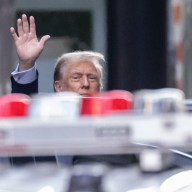OTTAWA – Karlheinz Schreiber says he tried to repair his famously strained relations with Brian Mulroney in the hope the former leader could help him win a sympathetic hearing from Prime Minister Stephen Harper.
Schreiber, testifying Thursday at a public inquiry, recounted the story of a “letter of comfort” he wrote Mulroney in July 2006 expressing regrets and apologies for their previous falling out.
The aim, he said, was to prove he and Mulroney were back on good terms, so the former prime minister could appeal to the new Conservative PM on his behalf.
Schreiber said he expected Mulroney to present the letter to Harper at a meeting scheduled to be held at the prime minister’s official summer residence at Harrington Lake.
The meeting took place, but both Mulroney and Harper have since vehemently denied that they discussed Schreiber’s legal troubles or his pending extradition to Germany on fraud, bribery and tax-evasion charges.
When inquiry counsel Richard Wolson wondered why Schreiber had to make his amends three years ago in writing, rather than orally, Schreiber replied that it was Mulroney’s idea.
“When you live in my world, the politicians come to you with the strangest requests, and you better respond,” he said.
Schreiber also testified that, although large portions of the letter were truthful, some were not.
For example, he said, his apology to Mulroney wasn’t really sincere. And he thought he’d never had an adequate explanation of why the so-called Bear Head project to build German-designed light-armoured vehicles in Canada never went ahead while Mulroney was in power.
Asked why he would write a letter containing false statements, Schreiber responded: “If every letter you sent out to politicians were to be true, we’d have quite a different world.”
In subsequent letters through late 2006 and early 2007, Schreiber continued to press Mulroney to make common cause with him in calling for a federal inquiry that could clear both their names of any alleged wrongdoing.
But the letters failed to elicit any response, and later missives sent directly to Harper also went unanswered – except for formula responses from government officials saying the prime minister couldn’t get involved in matters before the courts, like Schreiber’s extradition case.
February 2007 Schreiber was again writing to Mulroney – but this time to demand repayment of $300,000 disbursed to the former prime minister to lobby on behalf of the Beard Head project in 1993-94.
Again there was no response, and Schreiber eventually filed a lawsuit against Mulroney – then dropped it on the eve of the current inquiry headed by Justice Jeffrey Oliphant.
Schreiber says he didn’t want the suit to get in the way of the inquiry’s work, but Wolson has suggested the proceedings were dropped so Schreiber couldn’t face cross-examination in court by Mulroney’s counsel.
Schreiber has also changed his former view that Mulroney could be an ally in clearing his name. In a letter dispatched in March 2007, he listed Mulroney – along with Harper and Justice Minister Rob Nicholson – as participants in a “conspiracy and cover-up” against him.
Schreiber’s grievances arise only partly out of the Bear Head project. He has referred repeatedly, over the years, to a “political justice scandal” stemming from the sale of European-built Airbus jets to Air Canada during Mulroney’s time as prime minister in the 1980s.
The RCMP and Justice Department, in a 1995 letter to Swiss authorities, accused Mulroney of conspiring with Schreiber and former Newfoundland premier-turned-lobbyist Frank Moores in an alleged kickback scheme surrounding the Airbus deal.
No charges were ever laid against any of the men, and Mulroney later sued for libel and won a $1.2-million settlement from the former Liberal government of Jean Chretien.
Schreiber also testified he tried to “activate” Mulroney to promote a pasta business a decade after he paid Mulroney the last of the $300,000 cash to lobby for the armoured vehicle project.
The two had barely spoken in years and Schreiber says Mulroney had not fulfilled his end of their agreement. The armoured vehicle project was long dead, however, and Schreiber had a new interest – pasta.
In the faxed letters, Schreiber called Mulroney “Canada’s greatest deal broker ever” and tried to enlist his help in pushing a kind of spaghetti.
The German-Canadian businessman told the public inquiry that his pasta would have been “the miracle solution” to an “epidemic” of obesity among children, especially in the United States.
















